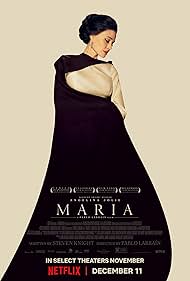Maria Callas, the world’s greatest opera singer, experiences the final days of her life in 1970s Paris as she confronts her identity and life… Angelina Jolie and director Pablo Larain discuss how they connected to the heartbreaking true story of world-renowned opera singer Maria Callas.. Angelina Jolie, refusing to be dubbed and wanting to perform her own singing, took 7 months of opera lessons to prepare for her role. For scenes during Callas’ heyday, approximately 90 to 95 percent of Callas’ original recordings were used, with Jolie lip-syncing along to these songs. However, Jolie’s singing comes to the fore during the film’s final act. When Angelina Jolie lip-syncs with Maria Callas’ original recordings throughout the film, her mouth movements are not synchronized with the audio.. Maria Callas: Book me a table in a café where the waiters know who I am. I’m in the mood for praise.. Featured in Close-Up: Why Do We Need the Venice Film Festival? (2024). Otello Act 4: ‘Ave Maria’ (Desdemona) Performed by Maria Callas, Orchestre de la Société des Concerts du Conservatoire Conductor: Nicola Rescigno Written by Giuseppe Verdi, Arrigo BoitoA Warner Classics Release, (p) 1964 Parlophone Records Limited Remastered 2014 Parlophone Records Limited Courtesy of Warner Music Group Germany Holding GmbH, a Warner Music Group company. I have to say that director Pablo Larrain’s 2024 entry into his iconic trilogy about women of the 20th century was a disappointment. It starts with the casting, as Angelina Jolie herself may be too iconic to portray the ultimate diva Maria Callas, the least memorable of the trio, the others being "Jackie" (2016) and Diana in "Spencer" (2021). Jolie demonstrates the necessary composure to carry the regal image of the world’s greatest opera singer, but physically she looks too skeletal to convincingly emulate the more robust figure that Callas managed. Written by Stephen Knight, the dark, long film covers the last week of Callas’ life in Paris in 1977, a fictional narrative with inevitable flashbacks that cumulatively plays out like a ghost story. All the production elements, like the polished cinematography and set details, are impressively crafted, but Larrain’s creative choices are more questionable, like the hallucinogenic images of people singing back to her in public places. There’s the ambiguous role of an interviewer (opaquely played by Kodi Smit-McPhee) with the same name as the medication she’s prescribed, who forces her to confront her heritage. Some of the flashbacks signal more intriguing elements of her story, like her rather early relationship with Aristotle Onassis, her traumatic encounters with Nazis as a child, and an intriguing conversation with JFK (played by Caspar Philipson in the same, somewhat inconsequential role in “Jackie”). Her reclusive existence is sustained only by two devoted servants, played touchingly by Pierfrancesco Favina and Alba Rohrwacher. Yet Jolie’s star power is on display, befitting her extraordinary talent for conveying both arrogance and vulnerability almost simultaneously. “One Hundred Years of Solitude” is one of the biggest TV and streaming releases this month. Check out our December calendar for more!
(4)



 24/37
24/37